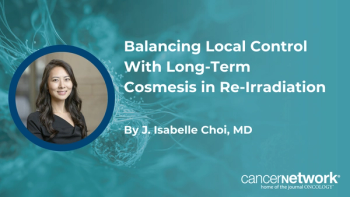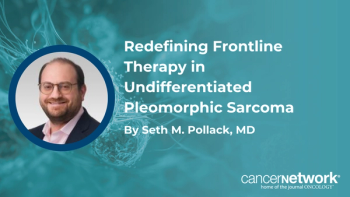
- ONCOLOGY Vol 13 No 3
- Volume 13
- Issue 3
Commentary on Abstract #433
Although rituximab was approved for the treatment of follicular, low-grade NHL, it is also being evaluated in other CD20+ tumors. Responses have previously been reported in large cell NHL and mantle cell NHL (Coiffier et al: Blood 92:1927-1932, 1998). These authors used 8 weekly infusions of rituximab at two different doses in 54 patients with intermediate- or high-grade NHL or mantle cell NHL. The complete remission rate was 9% with an overall response rate of 31%. Median time to progression as of publication was 246+ days.
Although rituximab was approved for the treatment of follicular, low-grade NHL, it is also being evaluated in other CD20+ tumors. Responses have previously been reported in large cell NHL and mantle cell NHL (Coiffier et al: Blood 92:1927-1932, 1998). These authors used 8 weekly infusions of rituximab at two different doses in 54 patients with intermediate- or high-grade NHL or mantle cell NHL. The complete remission rate was 9% with an overall response rate of 31%. Median time to progression as of publication was 246+ days.
Combination regimens incorporating the antibody in patients with aggressive NHL are under study. For example, as noted above, an intergroup trial conducted by ECOG and CALGB is randomizing elderly patients with intermediate- or high-grade NHL to CHOP with or without rituximab. The results of this study may redefine our approach to elderly patients with these histologies.
Rituximab also is being evaluated in other low-grade CD20+ tumors. Byrd and coworkers (abstract #433) described their preliminary experience with he antibody in seven patients with the low-grade lymphoplasmacytic lymphoma, Waldenström’s macroglobulinemia. These patients were heavily pretreated, with a median of three prior regimens, including fludarabine in four of them. At least a 50% reduction in immunoglobulin M (IgM) was observed in three patients and a 50% reduction in measurable disease in four patients. The median progression-free survival duration was 8 months. Thus, rituximab provides another tool to consider when designing treatment strategies for Waldenström’s macroglobulinemia and related disorders, and should be considered earlier during the course of the disease.
Articles in this issue
almost 27 years ago
WHO Declares Lymphatic Mapping to Be the Standard of Care for Melanomaalmost 27 years ago
Navelbine Increased Elderly Lung Cancer Patients’ Survivalalmost 27 years ago
Consensus Statement on Prevention and Early Diagnosis of Lung CancerNewsletter
Stay up to date on recent advances in the multidisciplinary approach to cancer.












































